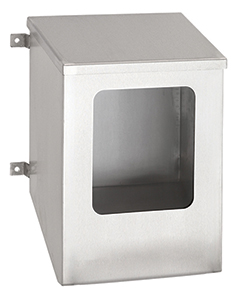Keeping abreast of the latest trends and developments in hygienic furniture and equipment is an effective way of ensuring that cleanroom environments remain efficient, future proof and support operational best practice.
Intelligently designed hygienic furniture delivers time-saving, and ultimately cost-saving, benefits on two levels. Firstly, the specification of accessories can help to streamline the wash-down, sanitising and gowning process before entering the cleanroom.
The smallest details can facilitate the most efficient routines possible for cleanroom users. For example, fast access to the gowning can make the process faster. Apply the time savings to each shift, and the value rapidly accumulates.
Secondly, design can dramatically impact on the time investment needed for cleaning and maintaining such accessories, particularly in the long-term. Whether it is easy access or the elimination of dirt traps, the result is the same: less time to deliver a thorough clean.

Stainless steel PPE dispenser with vision panel and slots
Equally as important as design, is the choice of material, which is why stainless steel is often preferred. Available in different grades, grade 304 is a popular choice because it is durable and robust enough to withstand the level of cleaning that auditors expect.
If the use dictates, for more aggressive cleaning routines, austenitic 316 grade can be used which contains more nickel and molybdenum for enhanced corrosion resistance.
With no pores or cracks to harbour dirt, grime or bacteria, stainless steel lets a simple cleaning solution do all but the toughest cleaning jobs. Wiping when washing, enhances bacterial removal and the cleanability of stainless steel.
Specifically, with sinks the company has seen a definite trend in customers moving towards infra-red and hands-free design choices. Of course, operating without touching avoids contamination build up and makes cleaning easier.
Popular choices include the infra-red Dyson taps, which not only enable touch-free operation but also feature Airblade technology, combining washing and drying in-one. Furthermore, the built-in HEPA filter means that the air blasted onto hands is clean.
Hands-free soap dispensers, either elbow operated or infra-red, are also becoming increasingly popular for the same reasons as their tap counterparts.
More and more customers are opting for a skirt at the bottom of their wash trough, which helps to minimise time spent on cleaning routines, says Springett. This shrouding prevents dirt from collecting underneath and the weekly clean down of the changing area is fast and efficient, because this is an easy surface to clean.
All of the products support hygiene control through intelligent design and excellent manufacturing standards
With personal protective equipment (PPE) dispensers, there has been a definite move to stainless steel as the material of choice because it is much stronger and easier to maintain an excellent level of hygiene with.
The dispensers that Teknomek designs hold most brands of disposable items, with easy access for restocking as well as dispensing the items. Many customers are opting to have such dispensers chemically etched, by product type, to quickly identify the contents: gloves, hair net, beard snoods, shoes, safety glasses, aprons etc.
Teknomek’s range of over 1,000 stock stainless steel products includes stainless steel sinks, wash troughs, taps, waste bins, dispensers, tables, desks, racks, shelving, and cupboards.
All of the products support hygiene control through intelligent design and excellent manufacturing standards. Many customers commission bespoke work, knowing that the design enables faster more efficient operation that supports their hygiene routines.
The company has made bespoke furniture for many cleanrooms and changing rooms. Whatever make, ease-of-use and compliance with good manufacturing practice are fundamental, as is supporting the gowning and preparation routines, before a cleanroom is entered.





